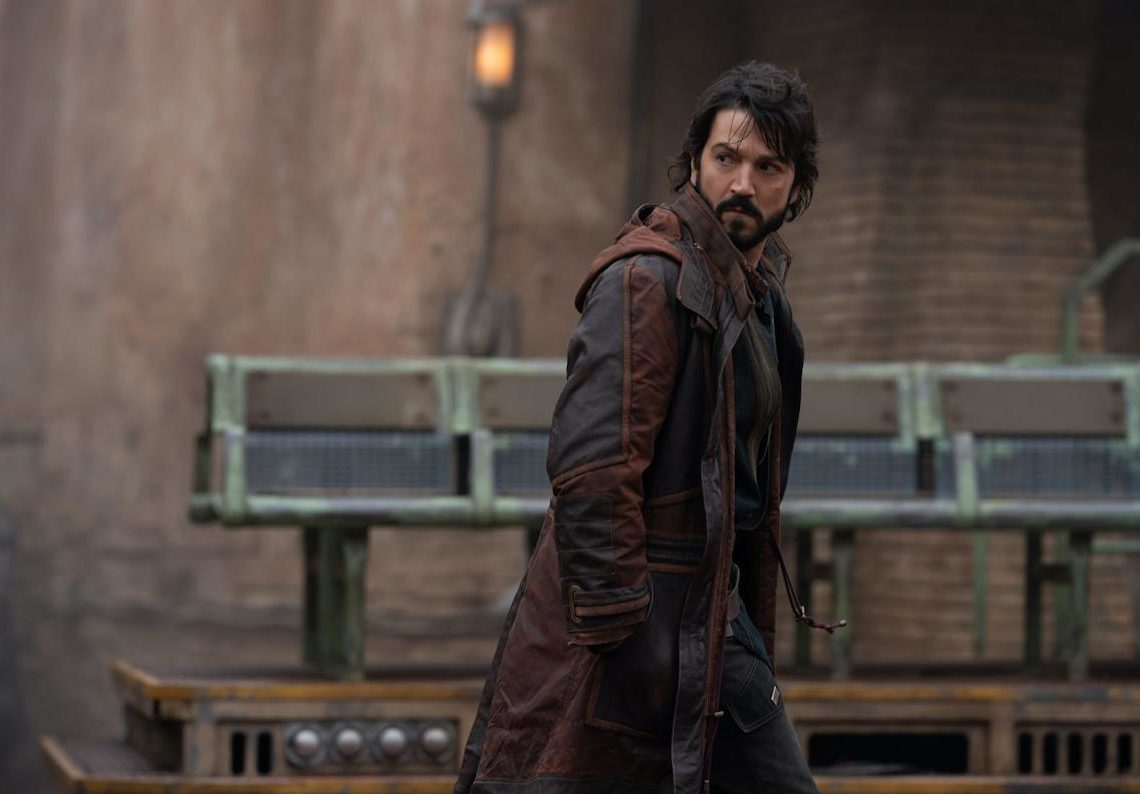Diego Luna as Cassian Andor in ‘Andor’ Credit – Des Willie—Lucasfilm
The second and reportedly final season of Andor, easily the best Star Wars television show or film that LucasFilm has produced in years, premiered on Disney+ on April 22. But it arrives at a moment of potential transition for the studio. Creator Tony Gilroy recently said he doesn’t think the streaming era can support shows like Andor. “No one’s ever gonna start a show on this scale again, and shoot it practically, and have the resources and the protection to do something like this,” he told Empire.
So what does the future of Star Wars television—and film—look like? Eight years after The Last Jedi hit theaters, we haven’t gotten a single Star Wars film. Instead, Disney has churned out a glut of television series: The mega-hit The Mandalorian, the miraculous Andor, and many more shows of varying levels of quality. The Star Wars universe even expanded into the real world with a hotel at Disney World that invited its guests to play Jedi and Sith as they interacted with in-character hotel staff. The closure of that cosplay resort sparked a multi-hour long viral video analyzing why the concept failed.
The future of the franchise does seem to hinge on a successful return to the big screen. And many potential Star Wars movies from famous writers like Game of Thrones’ David Benioff and D.B. Weiss, Lost’s Damon Lindelof, and The Shape of Water’s Guillermo del Toro have been announced and then scuttled. Meanwhile, President of LucasFilm Kathleen Kennedy is reportedly contemplating stepping down soon. Earlier this year, she told Deadline, “We’ll probably make an announcement [about my replacement] months or a year out, and I have every intention of sticking around to help that person be successful.”
Kennedy does have a couple films on the theatrical calendar. Iron Man director and Mandalorian creator Jon Favreau will helm The Mandalorian and Grogu, a spinoff of the hit TV series set to debut next year. And Deadpool & Wolverine’s Shawn Levy will soon begin shooting Star Wars: Starfighter starring Ryan Gosling. Here’s where LucasFilm stands ahead of Andor’s final season.
Read more: Andor Is the Best Star Wars Show Yet. Why Does It Feel Like No One’s Watching?
The critical success of Andor
From a critical perspective, Andor should be a blueprint for success at LucasFilm. In theory, the story could have been a rote Rogue One prequel: The show focuses on one of that film’s heroes, Cassian Andor (Diego Luna), and his indoctrination into the Rebellion. Instead, its a compelling spy thriller interrogating the reality of a gritty fight against totalitarianism. There are no Jedis, no secrets about Darth Vader’s past for Reddit sleuths to hunt down, no adorable creatures to slap on backpacks and lunchboxes. The show resists the temptation, to which so many of its peers have caved, to incessantly reference characters, objects, or plot points from its mother IP. (See: House of the Dragon or The Rings of Power’s obsession with flashbacks and Easter eggs.)
And while The Mandalorian is structured like a monster-of-the-week series with a new planet or challenge every episode or so, Andor is structured like well-crafted prestige television. Every few episodes, Cassian visits a new planet. Gilroy, who also wrote Rogue One, settles into each new location, meticulously builds character arcs there, and delivers an often crushing emotional blow at the end of each character’s story.
As I wrote of Season 1, Gilroy’s use of language is precise, and we’ll often hear the same turn of phrase uttered by both Empire stooges and the rebels, blurring the lines between good and evil. And the show’s focus on the daily, deadly, often stifling struggle against fascism strikes particularly hard at this moment: House of Cards’ Beau Willimon wrote a harrowing three-episode arc in Season 1 during which Cassian is picked up by authorities for a crime he didn’t commit and arbitrarily sentenced to years in a labor camp.
If there is a reason why Andor has succeeded creatively where other Star Wars TV shows have failed, credit must go to Gilroy, the writer behind Michael Clayton and the Bourne movies, as well as Willimon, who has become perhaps the most in-demand script polisher in Hollywood thanks to his work on both Andor and Severance.
Gilroy has credited the incredible commercial success of The Mandalorian, Disney+’s most popular series, with his ability to take creative risks with Andor. “The success of The Mandalorian gave us the platform to jump off,” he told Empire. “No Baby Yoda, no Andor. Seriously. Don’t think that we don’t know that.” And LucasFilm certainly deserves credit for trusting Gilroy and giving him ample funding even if his contemplative show didn’t reach the ratings highs of The Mandalorian. They were willing to take the risk because of the potential upside. Why the studio hasn’t found a similar collaborative approach with the likes of Lindelof or del Toro remains a mystery.
Before LucasFilm even wrapped the Skywalker saga with 2019’s Star Wars: Episode IX—The Rise of Skywalker, the studio seemed to be struggling with the cinematic direction of the franchise. Originally Colin Trevorrow was supposed to direct the ninth entry in the Star Wars series, then titled Star Wars: Duel of the Fates. But LucasFilm replaced Trevorrow with J.J. Abrams, who had helmed The Force Awakens, the first of several director switch-ups for the franchise.
The Lego Movie and 21 Jump Street directing team Phil Lord and Chris Miller were dismissed from 2018’s Solo: A Star Wars Story, an origin story for Han Solo, midway through production and replaced by Ron Howard. Solo underperformed at the box office, and the sequels that were seeded in the movie never came to fruition.
Disney CEO Bob Iger said at a 2023 conference that the “disappointing” box office returns for Solo, “gave us pause…maybe the cadence was a little too aggressive.” He added that going forward, “we’re going to make sure when we make one, it’s the right one. So we’re being very careful there.”
And careful, they have been. Star Wars movies that were announced only to disappear include a Boba Fett film from A Complete Unknown’s James Mangold, a Jabba the Hutt movie directed by del Toro, a trilogy from Benioff and Weiss, and a movie from Marvel Studios head Kevin Feige. Films from Thor: Ragnarok’s Taika Waititi and Wonder Woman’s Patty Jenkins appear to be on indefinite hold. That’s a lot of big directorial names who have come and gone with nothing to show for it.
The Disney+ television glut
When Disney+ launched in November of 2019, just before the pandemic, they flooded the streaming service with content derived from the House of Mouse’s most popular franchises, Marvel and Star Wars (and, for children, Pixar). A few early shows were huge hits, including The Mandalorian and WandaVision, in part because they defied expectations of what paint-by-numbers franchise TV-making might be. Marvel’s high-concept WandaVision, for instance, spoofed sitcoms through the ages. And The Mandalorian featured a massive twist at the end of the first episode: the introduction of an adorable creature we on the internet collectively dubbed “Baby Yoda.”
But perhaps in an effort to churn out as much content as possible, the shows that followed often felt like pale imitations of what came before them—series that were less creative, less compelling, more dependent on the viewer having watched hundreds of hours of Marvel or Star Wars content just to keep up with the plots. For Marvel, the simultaneous glut in content and drop in its quality have had an impact on box office for its feature films, which have not performed as well as the studio had hoped post-Avengers: Endgame.
LucasFilm hasn’t suffered the same fate in theaters simply because the studio has not produced any Star Wars movies in six years. But they have continued to flood Disney+ with TV shows, including Ahsoka, The Skeleton Crew, The Acolyte, Obi-Wan Kenobi, The Bad Batch, and Boba Fett. None of these shows have quite captured the zeitgeist like The Mandalorian did or garnered the critical praise of Andor. The overall effect on fans, based on social media chatter, has been simultaneous Jedi fatigue on the small screen and a yearning for a larger, sweeping stories in the cinema.
What’s next for Star Wars
Star Wars fans shouldn’t despair. Disney’s shareholders will pressure the company to eventually get another film set in a galaxy far, far away into movie theaters. Two Star Wars projects currently have a firm release date. The Mandalorian & Grogu, a spinoff of the hit TV series starring Pedro Pascal and Baby Yoda, is set for May 22, 2026. And Levy is directing a movie called Star Wars: Strarfighter starring Ryan Gosling, will debut in May 2027. That second film will star entirely new characters and be set about five years after the events of The Rise of Skywalker.
Meanwhile, after his Boba Fett movie fell by the wayside, Mangold is now reportedly working on a different Star Wars movie set 25,000 years before The Phantom Menace. And Simon Kinberg, who wrote many of the X-Men movies, has signed on to do a trilogy for the franchise.
The Last Jedi’s Rian Johnson says he may or may not return to the Star Wars universe for a once-announced trilogy after the he finishes writing and directing the Knives Out franchise. Jenkins’ Rogue Squadron movie was originally set for 2023 and has been delayed for years. An announced Waititi film similarly seems to be trapped in development purgatory. Still, perhaps one of these movies will see the light of day.
LucasFilm also announced a movie—or perhaps even trilogy—based on Rey Skywalker. Initially, the studio hired Lindelof for a Rey project. Lindelof later said (with good humor) that he was “asked to leave the Star Wars universe.” LucasFilm then tapped Locke’s Steven Knight to replace The Leftovers creator, though Knight, too, left the project, which may now be in limbo. Intriguingly, frequent Lindelof collaborators Carlton Cuse (Lost) and Nick Cuse (The Leftovers and Watchmen) are reportedly working on a Star Wars live-action series. Though a separate project, it’s easy to imagine those writers might share Lindelof’s sensibility.
Amid all these announcements, in 2023, Dave Filoni was named Chief Creative Officer at LucasFilm and charged with planning the future of Star Wars films and shows. Filoni cut his teeth on Star Wars animated series like The Clone Wars before working on The Mandalorian with Iron Man director Jon Favreau. But beyond bringing his biggest TV project to the big screen, details on the other future plans remain scarce.
That’s a lot up in the air, and fans are hopeful that some of these tentative plans will firm up in the near future. Until then, at least we’ve got Andor.
Write to Eliana Dockterman at [email protected].
The post Why There Hasn’t Been a Star Wars Movie in 6 Years—And What Comes Next appeared first on Time.



